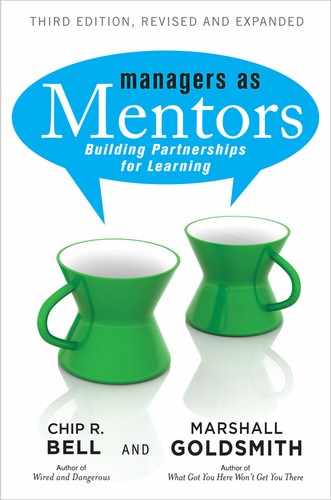SAGE: The Model for Great Mentoring
If the aim is to nurture “mastering”—through a mentoring partnership focused on learner discovery and independence, in a climate that reduces boundaries and encourages risk—what are the steps or stages needed to reach that aim?
The mentoring model found in this book is built around the belief that great mentoring requires four core competencies, each of which can be applied in many ways. These competencies form the sequential steps in the process of mentoring. All four have been selected for their ability to blend effectively. Not accidentally, the first letters of these four competencies (and steps) spell the word “SAGE”—a helpful mnemonic as well as a symbolic representation of the goal, the power-free facilitation of learning. They are:
Surrendering—leveling the learning field;
Accepting—creating a safe haven for risk taking;
Gifting—the core contributions of the mentor, the Main Event; and
Extending—nurturing protégé independence.
Surrendering
Most leaders are socially conditioned to drive the process of learning; great mentors surrender to it. Driving the process has many unfortunate effects. It tends to cause resistance; it minimizes the potential for serendipitous growth, and it tilts the focus from competence to control.
If there is one word many leaders hate, it is the word “surrender.” However, by “surrender” we don’t mean losing but yielding to a flow greater than either player in the process. The dictionary defines “surrender” as “to yield possession of.” Mentors who attempt to hold, own, or control the process deprive their protégés of the freedom needed to foster discovery.
Surrendering is the process of leveling the learning field. Most mentoring relationships begin with mentor and protégé in unequal power positions … boss to subordinate, master to novice, or teacher to student. The risk is that power creates anxiety and anxiety minimizes risk taking—that ever-important ingredient required for growth. Surrendering encompasses all the actions the mentor takes to pull power and authority out of the mentoring relationship so protégé anxiety is lowered and courage is heightened.
Accepting
Accepting is the act of inclusion. Acceptance is what renowned psychologist Carl Rogers labeled “unconditional positive regard.” Most managers are taught to focus on exclusion. Exclusion is associated with preferential treatment, presumption, arrogance, and insolence—growth killers all. The verb “accept,” however, implies ridding oneself of bias, preconceived judgments, and human labeling. Accepting is embracing, rather than evaluating or judging.
Accepting is code for creating an egalitarian, safe haven for learning. When mentors demonstrate noticeable curiosity, they telegraph acceptance. When mentors encourage and support, they send a message that safety abounds. Protégés need safety in the mentoring relationship in order to undertake experimental behavior in the face of public vulnerability.
Gifting
Gifting is the act of generosity. Gifting, as opposed to giving, means bestowing something of value upon another without expecting anything in return. Mentors have many gifts to share. When they bestow those gifts abundantly and unconditionally, they strengthen the relationship and keep it healthy. Gifting is the antithesis of taking or using manipulatively. It is at the opposite end of the spectrum from greed.
Gifting is often seen as the main event of mentoring. Mentors gift advice, they gift feedback, they gift focus and direction, they gift the proper balance between intervening and letting protégés test their wings, and they gift their passion for learning. However, just as we all recoil at the sound of “Let me give you some advice,” protégés must be ready for the mentor’s gifts. Surrendering and accepting are important initial steps in creating a readiness in the protégé. Gifts are wasted when they are not valued—when they are discounted and discarded.
Extending
Extending means pushing the relationship beyond its expected boundaries. Mentors who extend are those willing to give up the relationship in the interest of growth, to seek alternative ways to foster growth. They recognize that the protégé’s learning can occur and be enhanced in many and mysterious ways. Extending is needed to create an independent self-directed learner.
Surrendering, accepting, gifting, and extending are the capabilities or proficiencies required for the mentor to be an effective partner in the protégé’s growth. These four core competencies also serve as the organizing structure for the rest of this book. Their sequence is important. The process of mentoring begins with surrendering and ends with extending. Under each of the four competencies you will find several chapters full of techniques for demonstrating that competence effectively.
Mentoring is an honor. Except for love, there is no greater gift one can give another than the gift of growth. It is a rare privilege to help another learn, have the relevant wisdom to be useful to another, and partner with someone who can benefit from that wisdom. This book is crafted with a single goal: to help you exercise that honor and privilege in a manner that benefits you and all those you influence.
